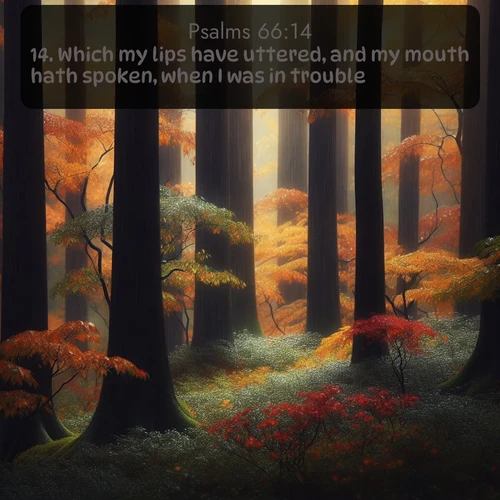Psalms 66:14 plusieurs versions / traductions
English Bible Translations
14. Keeping the word which came from my lips, and which my mouth said, when I was in trouble.
14. Which my lips have uttered, and my mouth hath spoken, when I was in trouble.
14. Which my lips have uttered, and my mouth hath spoken, when I was in trouble.
German Bible Translations
14. wie ich meine Lippen habe aufgetan und mein Mund geredet hat in meiner Not.
14. welche sich meinen Lippen entrungen haben und die mein Mund geredet hat, als mir bange war.
French Bible Translations
14. mes lèvres se sont ouvertes pour les exprimer, ma bouche les a prononcés quand j'étais dans la détresse.
14. Pour eux mes lèvres se sont ouvertes,Et ma bouche les a prononcés dans ma détresse.
14. Pour eux mes lèvres se sont ouvertes, Et ma bouche les a prononcés dans ma détresse.
14. Ce que mes lèvres ont proféré, et que ma bouche a dit dans ma détresse.
14. Lesquels mes lèvres ont proférés, et que ma bouche a prononcés, lorsque j'étais en détresse.
14. Que mes lèvres ont proférés et que ma bouche a prononcés dans ma détresse.
Versions with Strong Codes
Psalms 66 / KJV_Strong14.
Strong Code definitions
H834 'aher ash-er' a primitive relative pronoun (of every gender and number); who, which, what, that; also (as an adverb and a conjunction) when, where, how, because, in order that, etc.:--X after, X alike, as (soon as), because, X every, for, + forasmuch, + from whence, + how(-soever), X if, (so) that ((thing) which, wherein), X though, + until, + whatsoever, when, where(+ -as, -in, -of, -on, -soever, -with), which, whilst, + whither(- soever), who(-m, -soever, -se). As it isindeclinable, it is often accompanied by the personal pronoun expletively, used to show the connection.
H8193 saphah saw-faw' or (in dual and plural) sepheth {sef-eth'}; probably from5595 or 8192 through the idea of termination (compare 5490); the lip (as a natural boundary); by implication, language; by analogy, a margin (of a vessel, water, cloth, etc.):--band, bank, binding, border, brim, brink, edge, language, lip, prating, ((sea-))shore, side, speech, talk, (vain) words. see H5595 see H8192 see H5490
H6475 patsah paw-tsaw' a primitive root; to rend, i.e. open (especially the mouth):--deliver, gape, open, rid, utter.
H6310 peh peh from H6284; the mouth (as the means of blowing), whether literal or figurative (particularly speech); specifically edge, portion or side; adverbially (with preposition) according to:--accord(-ing as, -ing to), after, appointment, assent, collar, command(-ment), X eat, edge, end, entry, + file, hole, X in, mind, mouth, part, portion, X (should) say(-ing), sentence, skirt, sound, speech, X spoken, talk, tenor, X to, + two-edged, wish, word.see H6284
H1696 dabar daw-bar' a primitive root; perhaps properly, to arrange; but used figuratively (of words), to speak; rarely (in a destructive sense) to subdue:--answer, appoint, bid, command, commune, declare, destroy, give, name, promise, pronounce, rehearse, say, speak, be spokesman, subdue, talk, teach, tell, think,use (entreaties), utter, X well, X work.
H6862 tsar tsar or tsar {tsawr}; from H6887; narrow; (as a noun) a tight place (usually figuratively, i.e. trouble); also a pebble (as in 6864); (transitive) an opponent (as crowding):--adversary, afflicted(-tion), anguish, close, distress, enemy, flint, foe, narrow, small, sorrow, strait, tribulation, trouble.see H6887 see H6864
Prédications qui analysent les thèmes Psaumes 66
Thèmes : Pour la gloire de Dieu; Prière de secoursRelated Sermons discussing Psalms 66
Themes : Pour la gloire de Dieu; Prière de secourssee also: Bible Key Verses ; KJV Bible Images, BBE Bible images

